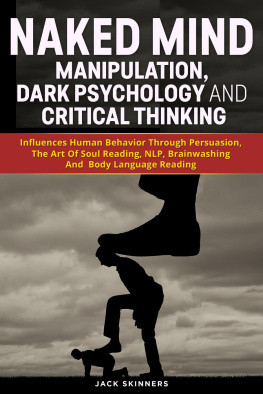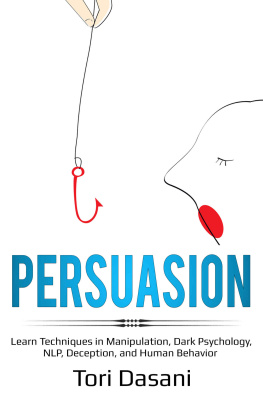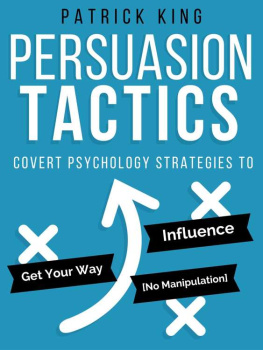Psychology 101
How To Control, Influence, Manipulate and Persuade Anyone
By Anthony Kane
Copyright 2015 by Make Profits Easy LLC
profitsdaily123@aol.com
Table of Contents
Introduction
Throughout history, we have witnessed mankind being moved to action such as engaging in war, racism, religious intolerance, and ethnic cleansing. These are all products of persuasion, where people were presented with information beforehand and were then convinced that they needed to engage in actions regardless of how terrifying in order to act on their beliefs.
Today, in a smaller and less harmful scale, we are still exposed to many kinds of persuasion even if we arent fully aware of it. We encounter hundreds of ads on a daily basis through televisions, computers, radio, and even the people we meet may try to convince us of something.
The topic of persuasion is one of the most interesting matters in psychology today. In short it is described as the ability to convince a person or group of people to change their beliefs strong enough to act on them. Persuasion can come in many forms and its success also depends on many other factors.
In this book you will learn about the many aspects involved with persuasion.
Readers will learn:
- The different kinds of social influence: compliance, conformity, and internalization
- The definition of conformity
- Famous studies conducted as an attempt to explain obedience
- Principles of social influence
- How to be a good persuader in various situations: in business, social settings, and in relationships
Chapter 1: Social Influence
Social influence is a major branch in psychology that examines how a persons actions, thoughts, and beliefs are influenced by social groups. When a person succeeds in changing a persons beliefs or actions, this results in conformity.
According to Harold Gerard and Morton Deutsch, there are two psychological needs that lead individuals to conform to expectations of other people. These are:
1. Informational social influence: Addresses ones need to be right. Informational social influence happens more likely when people are uncertain thereby are willing to accept information from other people as evidence.
2. Normative social influence: Addresses ones need to be liked by others. Normative social influence arises out of ones need to conform to other peoples positive expectations. According to Kelman, normative influence results in public compliance as compared to informational social influence which results in private acceptance.
These are the factors that affect conformity:
1. Difficulty: When a task is seen as difficult, this can lead to decreased or increased conformity. When a person doesnt know how to perform a task they are more likely to conform although when it is perceived as more difficult people are usually more accepting of different responses that result in conformity.
2. Individual differences: Decreased tendency to conform is linked in people who have motivation to achieve and have stronger leadership characteristics.
3. Group size: Conformity is more likely to happen in groups of 3 to 5 people.
4. Situational character: Individuals are more likely to conform if the situation is ambiguous and they are not sure how to respond best.
5. Cultural differences: People coming from collectivist cultures are more likely to conform than others.
Sources of Social Influence
On broad terms, there are 3 sources of social influences currently recognized by psychologists. In short, people are influenced through these 3 sources:
1. Social Institutions: These include political parties, labor unions, and organized religion.
2. Interactions with other people: The types of people we interact with at work, at home, and at social settings are sources of social influence.
3. Individual socialization: Refers to the amount of socialization an individual receives and is open to. Socialization is a process that inducts humans to a culture or society, and begins as early as infancy. Products of socialization include the language we speak, the ideas and beliefs we hold to be true, and our own characteristics and behavior.
Cialdinis Principles of Social Influence
The 6 principles of social influence are in a nutshell, described as how an individual can influence others to say yes. These were created by renowned psychologist Robert Cialdini as published in his 1984 book, Influence: The Psychology of Persuasion.
1. Reciprocity: It is part of human nature to return favors and generally treat others as we are treated. The principle of reciprocity states that humans feel obliged offer favors and discounts to other people if they were offered to us as well. This behavior arises because humans generally feel uncomfortable when they are faced with feeling indebted to other people.
For example, if a supplier offers you a large discount for purchasing from them in bulk you may be prompted to buy more from them. If a coworker helps you during a busy project, you may feel obliged to buy them lunch to return the favor, or support their ideas in the long run.
2. Commitment and Consistency: According to Cialdini, humans have an innate desire for consistency. This is why when we commit to something we are more encouraged to follow through until the end.
For example, if you show interest in a coworkers idea when they first discussed this with you, you would be more inclined to support his project proposal.
3. Social Proof: This principle of social influence is also referred to as safety in numbers. People are more inclined to act when others are doing the same. This includes eating in busier restaurants, or taking on overtime schedules if coworkers are doing the same. Individuals are more vulnerable to this principle of social influence when they are feeling uncertain or if the people are similar to us.
4. Liking: People are more easily influenced by those that they like. A persons likability may come in various forms, such as their familiarity or similarity to us, when they give us compliments, or simply the fact that we trust them more than others. People are more likely to buy from people that they already know and trust. For this reason, companies that utilize the services of sales agents employ them from existing communities so that more people are familiar with them and end up buying.
5. Authority: People naturally feel obliged to people who are viewed with a sense of authority. This is the reason why advertising companies often hire authorities in certain fields to advertise their products. For example, dentists promoting toothpaste, doctors promoting medication, athletes promoting shoes. It is also because when a person is authoritative over us that we tend to say yes, such as when a manager asks us to complete a task. Certain things can also lend an air of authority, such as the use of uniforms, job titles, and other accessories.
6. Scarcity: According to the scarcity principle of social influence, people are more inclined to like something when it has limited availability. People are more likely to purchase something when they are told that it is the last of its kind available, or it is offered at a discount that will expire soon.
Oftentimes, these 6 principles are used to mislead people such as by getting them to purchase products at high prices. Using this approach is always best when you are convincing people to do something that is good for them. It is always best to be honest, such as providing factual information for people to make a well-informed decision.
Kelmans varieties of social influence
When people change their opinion as a result of persuasion or social influence, this results in 3 types of changes:
Next page









